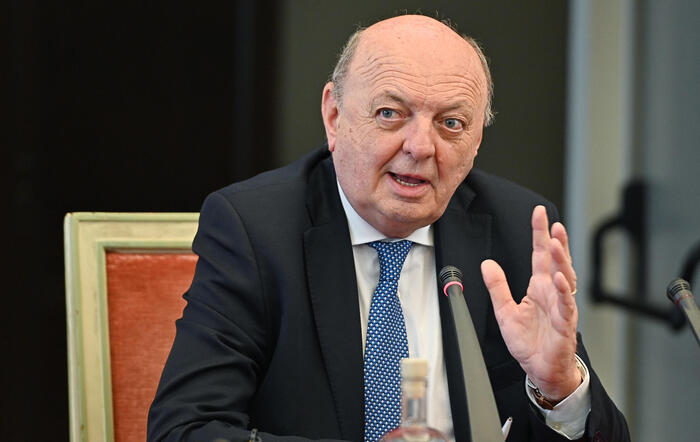On the rainy, windy Saturday afternoon of October 10, 1981, Helmut Schmidt must have swayed that his chancellorship shook. Just a 20-minute walk from the Federal Chancellery down the Rhine, around 300,000 people crowded into the Bonn Hofgarten and demonstrated against its armaments policy. The writer Heinrich Böll and Martin Luther King's widow Coretta Scott King made speeches, as did Social Democrats and Erhard Eppler.
This turned a left-wing avant-garde against a head of government who presided over a left-wing workers' party. Schmidt had survived the economic and oil crises as well as the terror of the RAF and the protests of nuclear power opponents. The backing he lost in the end by the NATO double decree of December 12, 1979.
The demonstration in the Bonner Hofgarten was one of the highlights of the peace movement. Protests against the arms race between East and West joined millions in Germany in the early 1980s - including footballer Ewald Lienen. When the NATO states ratified the double decision in Brussels, he was 26 and kicked with blowing mane for Borussia Mönchengladbach.
The peace demos were mainly about two things, remembers the current technical director at FC St. Pauli: to "the madness that everything can disappear if someone presses the red button". And the billions invested in armor instead of society. Lienen got involved for the first time politically and still tells today with the enthusiasm of that time: "We felt the spirit of optimism, the strength, when many people pursue a common goal, and it was clear that politics had to react to it."
Whoever shoots first, dies second
At first, however, the Soviet Union put billions in new weapons. In 1977, the Brezhnev government decided to renew the stock of nuclear missiles aimed at the western world. Old weapons were sorted out and hundreds of state-of-the-art SS-20 missiles were stationed at bases in Belarus, Ukraine and Siberia.
Helmut Schmidt feared a superior Soviet arsenal and urged the NATO partners follow suit - Germany was the most probable battlefield of a possible nuclear war with the situation between NATO countries and Eastern Bloc. By deterrence, the Soviet Union was to be prevented from nuclear first strike: a "balance of terror".
photo gallery
24 pictures
NATO Double Resolution: Peace Movement versus Cold WarriorsThe NATO response to SS-20 was Pershing II: extremely precise rockets, with multiple speeds of sound on the way, in addition cruise missiles (Cruises Missiles). The technical strength of the weapons was at the same time their doom. Because in the threat scenarios the parameters changed. A nuclear attack would leave little time to react - increasing the risk of making a devastating, fatal decision under pressure in a false alarm.
The NATO double decree fell into a time of change in the leftist milieu. Above all, the dangers of nuclear power drove demonstrators to the streets, for example, against the planned nuclear waste storage in Gorleben, the nuclear power plant in Wyhl and Brokdorf. A "New Left" linked socio-political ideals of the '68 with ecological awareness and concern for the survival of humanity.
"More than once you can not kill yourself"
The early eighties were an era of darkest visions of the future. The fear of an atomic apocalypse became in Germany the overarching theme of sometimes hysterical debates. It left deep furrows, split the society - and at the same time completely different groups. Left-wing activists met Protestant pastors in freshly-formed citizens' initiatives, and 16-year-old politicians politically hypnotized retired engineers.
Together, they painted peace doves on banners for the next Easter march and sprayed pacifist slogans on the walls, interpreting military strategy papers, leaning over maps with weapon locations in East and West rocket counter for beginners and advanced. Everyone was convinced that a Third World War, triggered by the Cold Warriors, would certainly be the last.
With the Greens, soon to succeed in elections, the environmental and peace movement got a strong parliamentary arm. And the fact that the Federal Chancellor vehemently pushed forward both nuclear energy and the double decree meant a crush on the SPD. Helmut Schmidt became the enemy of the extra-parliamentary left as well as parts of his own party.
Oskar Lafontaine was Saarbrücken's SPD mayor at the beginning of the 1980s and says many Social Democrats have criticized Schmidt's security strategy from the outset. The chancellor's most prominent opponent was his predecessor - Willy Brandt. "As a party leader, of course, he tried not to push Schmidt too hard, but it was clear he was on the side of opposing the rearmament," says Lafontaine. Later, Brandt also appeared as a speaker at peace rallies.
In addition to Erhard Eppler, Lafontaine was one of the loudest spokesmen for the inner-party opposition: "We considered the equilibrium theory obsolete, the fact was: we were in the age of total armament, however many missiles we would set up - more than once you can not kill yourself. "
Reagan's morbid jokes
The double decision had a second dimension: arms control through negotiations. NATO wanted to push the USSR. However, the Soviet invasion of Afghanistan Christmas 1979 ended all hopes for a diplomatic solution. Even before the first Pershing II rocket was launched in Europe, the White House was now playing with the idea of a first strike. When Republican Ronald Reagan replaced Democrat Jimmy Carter in 1980, the tone between the US and the "realm of evil" tightened, as the new US president called the Soviet Union.
Above all, his loose mouth made the left shudder. Ex-actor Reagan used a penchant for quirky jokes. He had just declared Russia outlawed, "we'll start the bombing in five minutes," he proclaimed in 1984 - out of jubilation, but nobody in Moscow laughed. In the West, doubts grew about the sincerity of the former Western hero, who had come up with fantastic plans for rocket defense in space (SDI aka "Star Wars") the year before. Reagan wanted to defeat the Soviet Union by military superiority, instead of seeking the conversation. "He spoke openly of the dead set," says Lienen, "that was a monstrosity in an actually enlightened world."
In this climate, a broad coalition called for a major peace demonstration in Bonn's Hofgarten in 1981; There were also gigantic demos in Amsterdam, Brussels or The Hague. And on October 22, 1983 alone, 1.3 million people protested in Germany.
The end of the government Schmidt initiated, however, not left-wing socialists like Lafontaine or Eppler, but the coalition partners: On September 7, 1982, all FDP ministers resigned. The then interior minister Gerhart Baum says today that the protests have also impressed parts of the liberals, above all the left-liberal citizens' wing, to which he himself belonged. Ultimately, Foreign Minister and party leader Hans-Dietrich Genscher convinced him of the correctness of the double decision: "It was an important element of Genscher's strategy to persuade the Soviet Union to rethink."
"We have downed the Soviets"
The support that the Liberals gave to their leaders was not felt by Schmidt and the Social Democrats, according to Baum - one of the reasons why the FDP withdrew. Ultimately, however, it was not the foreign policy strategists who initiated this break: "Economics Minister Otto Graf Lambsdorff was the one who wanted to end the coalition." Genscher was in his wake at times. " Lambsdorff formulated in the "divorce paper" the economic policy demands of the FDP: The clear rejection of the social-liberal course meant a government offer to the Union.
The FDP was from then on reviled as "Umfallerpartei" and Helmut Schmidt on October 1, 1982 by a constructive vote of no confidence overthrown, the first successful in the history of the Federal Republic. As new chancellor Helmut Kohl adhered to the NATO double-decision and also implemented it: In November 1983, the Bundestag decided to station Pershing II missiles in Germany. By 1986, 108 missiles were distributed on barracks in Baden-Württemberg, despite protests and sit-ins; In addition, there were around 300 cruise missiles in Western and Southern Europe.
Meanwhile, the SPD turned completely against the NATO double decision. At the Cologne party congress in 1983, only 14 out of 400 delegates carried along the course of their ex-chancellor. In 1988, Helmut Schmidt himself should sum up that his commitment to the double decree cost him the chancellorship.
Despite being stationed, Oskar Lafontaine believes the peace movement has achieved its goal: "We have changed the political climate: disarmament and peace have been debated over armaments and deterrence, and the peace movement has been instrumental in concluding armaments limitation treaties." In fact, the relationship of the West to the Soviet Union under Mikhail Gorbachev relaxed. With the INF Treaty of December 1987, the US and USSR agreed to destroy all medium-range missiles; Donald Trump resigned from the contract last August.
Gerhart Baum rates the American-Russian thaw of the late eighties quite differently than Lafontaine. The NATO double-decision, the strategy of Schmidt and Genscher would ultimately have been effective, he says today - "in other words, we have downed the Soviets".







